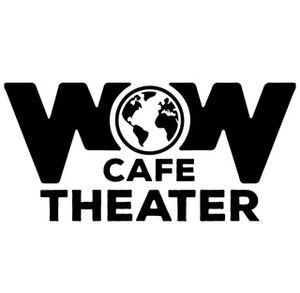WOW Café facts for kids
 |
|
| Address | 59-61 E 4th St New York, NY United States |
|---|---|
| Coordinates | 40°43′32″N 73°59′30″W / 40.725656°N 73.991794°W |
The WOW Café Theater is a special theater space and group in the East Village, Manhattan, New York City. In the mid-1980s, it was a very important place for new and experimental theater and performance art in the East Village. Many famous artists have performed there. Some of these artists include Peggy Shaw, Lois Weaver, Lisa Kron, Holly Hughes, Deb Margolin, Dancenoise, Carmelita Tropicana, Eileen Myles, Honor Molloy, Split Britches, Johnny Science, and The Five Lesbian Brothers.
The WOW Café is still active today. Its members meet almost every Tuesday to plan and create.
Contents
How WOW Café Works
The WOW Café Theater runs on ideas of anarchy, which means everyone has an equal say. Decisions are made together through consensus decision-making, where everyone agrees. Members do not pay fees to join. Instead, they help out by working, which is called sweat equity.
The WOW Café is an open space for all women and/or transgender people. It especially welcomes women of color and queer women. Most decisions happen at group meetings held on Tuesdays at the WOW space on East 4th Street. Since the start of the COVID-19 pandemic in the United States, these meetings have moved online.
History of WOW Café
Starting in the 1980s
The WOW Café Theater began when two of its founders, Lois Weaver and Peggy Shaw, traveled in Europe. They saw women's theater festivals there and were inspired. They wanted to start a similar festival in America.
In 1980, they teamed up with Jordi Mark and Pamela Camhe. They created the Women's One World Festival. It was held at the All-Craft Center in the East Village. The festival aimed to be a "multimedia environment." This meant it had performances, a social café, film screenings, and dancing. Many performers came from Europe. The festival was self-funded, so performers often covered their own costs. They were happy to perform in New York and gain experience.
The festival was a big success. Because of this, the All-Craft Center allowed them to host weekly performance nights.
Finding a New Home
Eventually, WOW had to leave the All-Craft Center. This was due to pressure from the center's board. The group then found a new place at the Ukrainian National Home. They used a ballroom there for their shows. After a second festival at this new location, the WOW Festival members decided to create a permanent performance space. They raised money through parties and special shows. Finally, they found a space at 330 East 11th Street.
At first, this new space was more of a café. They sold sandwiches and coffee. It was a social spot more than an art space. But soon, WOW built a small stage. They started holding performances there again.
Early shows included Well of ... by Holly Hughes. Other works were Split Britches and Beauty and the Beast by Split Britches. Tennessee Waltz was also an early show. Besides theater, the space hosted brunches, art exhibitions, and Variety Night. They also had Cabaret BOW WOW and Talking Slide Shows.
In 1983, Susan Young became the booking manager. The WOW Café became more organized as a performance space. It was no longer managed only as a collective. Young's influence made the Café more formal. It allowed outside groups to organize some events. This meant the Café didn't have to handle all production for every show.
In 1984, WOW moved to its current location on East 4th Street.
How WOW Got Money
Most of WOW's costs were covered by ticket sales. But sometimes, rent and utilities needed extra help. They would hold benefits, parties, or paid dances. Sometimes, they even asked people passing by for donations. Many founding members used their own money from other jobs to help.
The founders did not want to apply for big grants. They preferred to raise money from their community. They also donated their own money and accepted small grants. They believed in complete freedom of expression for artists. They did not want to change their work to get or keep grants.
Open Performances and Focus
To keep the feeling of teamwork and openness, WOW did not hold auditions for performers. They believed auditions could lead to censorship. They felt they had experienced censorship before. The WOW Café focused on stories about women's lives. Many performances explored and challenged gender roles. Some people criticized their use of certain identities in shows. But the Café said these portrayals were social commentary. Performers often made gendered parts of characters very obvious to highlight them.
WOW in the 2000s
In 2005, the WOW Café Theater updated its mission. It clearly stated that it welcomes all women and/or trans people. WOW is part of Arc on 4th Street. It is also a founding member of Fourth Arts Block. This group started in 2001. It was formed by different cultural and community groups on East 4th Street. Their goal was to protect their spaces. Since 2005, WOW has made it a priority to welcome people of all ages, races, religions, backgrounds, and gender identities.
Important Shows
- Well of ... (written by Holly Hughes (1985))
- Split Britches (written and directed by Peggy Shaw, Lois Weaver, and Deborah Margolin (1981))
- Beauty and the Beast (written and directed by Peggy Shaw, Lois Weaver, and Deborah Margolin (1982))
- Upwardly Mobile Home (written and directed by Peggy Shaw, Lois Weaver, and Deborah Margolin (1984))
- Voyage to ... (written by The Five Lesbian Brothers, directed by Kate Stafford (1990))
- Brave Smiles...Another ... Tragedy (written by The Five Lesbian Brothers, directed by Kate Stafford (1992))
- Les Beaux Luv (written by Honor Molloy (1993))
- Little Women (written and directed by Peggy Shaw, Lois Weaver, and Deborah Margolin (1988))
 | Aaron Henry |
 | T. R. M. Howard |
 | Jesse Jackson |

